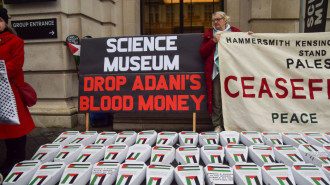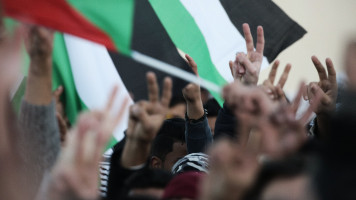
Eid a chance for family reunion in northeast Syria

Syrians from northeast Syria which is under the control of the Autonomous Administration of North East Syria (AANES), with relations residing in Europe will have a chance to get together for family gatherings during this Eid holiday.
This follows years of estrangement, as relations who fled Syria were cut off from family for years as they sought asylum in European countries.
Those who have obtained citizenship, or residency rights in European states have in many cases been able to enter Syria without obstacles.
Several days ago, Adnan Mohammed arrived in Qamishli city in the countryside of Al Hasakah governorate. He said to Al-Araby Al-Jadeed, The New Arab's Arabic-language sister-edition: "I've lived in Finland for 10 years, and I have a Finnish residency card. I can travel to all of the European countries, but has been difficult for me to come officially to northeast Syria — and Qamishli specifically. We are counted as refugees in Europe and will be subjected to questioning if we go back to Syria, because we are considered refugees who fled from the regime."
"I'm here to see my brothers and sisters who have got married and who now have children, who I've never met! I miss the village, my friends and the neighbourhoods I used to live in"
He says the visit "is a chance for us to see our families. I only have my parents left, and they are elderly now. I came to the Kurdistan region of Iraq, and was able to enter [Syria] from there, using my Syrian ID without needing a visa."
He says he is considered to be staying in the Iraqi Kurdistan region, but that he won't be able to inform the authorities that he was in Syria.
"I love spending Eid with my family. This is where we’re from, and we always try to help the family and friends as much as possible. I am overjoyed I've been able to visit Syria, though it saddens me to see the current situation in the light of the lack of services and electricity and other things."
|
|
Mihyar Issa lives in Germany and has been unable to visit his family back in Syria until now.
"I've lived in Germany for around 15 years, and am wanted for the obligatory military service. I'm here to see my brothers and sisters who have got married and who now have children, who I've never met! I miss the village, my friends and the neighbourhoods I used to live in."
Karim Hassan, who lives in Sweden, says: "I've lived for years in Sweden and there are always things making me want to visit my country [Syria]. Some of my friends go to visit relatives and family and others go when someone has died. The reason for this visit is the approach of Eid.
"Some people want to try and make up for what they've missed, because we have lost so much — after years of working in Europe, we come back to try and recover what we've lost," Karim says, adding that some also try to assist back home by working on and investing in projects.
As prices soar, Palestinians in Gaza prepare to celebrate Eid al-Fitrhttps://t.co/NgFQo65VGN
— The New Arab (@The_NewArab) April 17, 2023
For Sara Hamid, after long years seeking and then obtaining asylum in Holland, visiting her family for the Eid holiday is a chance for her to finally get married, after a long engagement to her cousin which has dragged on due to her struggle to obtain asylum in Europe.
"I got out with my family years ago through agents and people smugglers in Europe, and we now have residency in Holland. We have learnt the language, and some of us are working and others are living on state benefits," she explains.
"While we haven’t managed to integrate fully in Holland, especially us women, I will try to work on getting family reunion papers and bring my fiancé to Holland."
The regional government of Iraqi Kurdistan allows Syrians who hold residency permits in European countries or have obtained citizenship, to enter into Syrian territory.
The procedures are considered relatively easy and obstacle-free, which is providing a route by which some Syrians now residing outside Syria are able to return and visit their relatives in northeast Syria.
This is an edited translation from our Arabic edition. To read the original article click here.
Translated by Rose Chacko
This article is taken from our Arabic sister publication, Al-Araby Al Jadeed and mirrors the source's original editorial guidelines and reporting policies. Any requests for correction or comment will be forwarded to the original authors and editors.
Have questions or comments? Email us at: info@alaraby.co.uk



